Nature Knows and Psionic Success
God provides
7 Foods That Can Improve Your Brain Health, According To Experts

WAYHOME studio/Shutterstock One of the keys to living a long and healthy life is keeping your brain in good shape. There are many different ways to do that from getting enough sleep and exercise to doing activities that keep your mind stimulated. But most importantly, choosing the right foods to eat makes a big difference. If you want to improve your brain health , experts say there are certain foods that you should be eating right now. "You are what you eat is not just a saying, it’s a fact," Dr. Catherine Jackson , licensed clinical psychologist and board certified neurotherapist, tells Bustle. "If you put too much [non-nourishing foods] in, you feel sluggish , your mood is thrown off, and your brain does not function at its best." Numerous studies have found that lower levels of nutrients are linked to depression . People who suffer from depression tend to lack the right amount of essential vitamins, minerals, and omega-3 fatty acids. A 2016 study published in the American Journal of Public Health also found that people who went from eating zero portions of fruit and vegetables each day to eating up to eight portions saw an increase in levels of happiness and life satisfaction. "Our brain health is clearly impacted by our diet," William W. Li, M.D., author of Eat to Beat Disease: The New Science of How Your Body Can Heal Itself , tells Bustle. "Eating diets full of fruits and vegetables, healthy fats like olive oil, seafood, legumes, and limited meat are optimal for brain health." So here are some foods that are guaranteed to boost your brain health, according to experts. 1. Blueberries "A good well-balanced diet loaded with nutrients, vitamins and minerals allows our brain to thrive and function at its highest capacity," Janette […]
Many millennials prefer natural medicine: “The most anxious generation” is getting anxiety relief from CBD oil

( Natural News ) Perhaps unfairly, Millennials carry many labels, including, “the most useless generation of all time.” However, recent research may explain why some Millennials seem to struggle to cope with doing the things that earlier generations took in their stride: Growing up, moving out, pursuing a career, getting married, buying a home, etc. A recent survey of adult baby boomers (54 to 72-year-olds), Generation Xers (people aged between 38 and 53), and Millennials (those aged between 20 and 37), conducted by the American Psychiatric Association (APA), found Millennials to be the most anxious generation of all. Faced with escalating unemployment rates, larger student loans and a lower chance of owning their own home, many Millennials struggle with anxiety and depression. The survey found that young Americans are incredibly stressed about health, safety and the ability to pay their bills. Conventional treatments for anxiety and depression include antidepressant medications like Selective Serotonin Reuptake Inhibitors (SSRIs) and benzodiazepines like valium, but these medications carry serious side effects and the risk of long-term addiction. Fortunately, an increasing number of Millennials are turning to a far safer source of anxiety relief: CBD oil . Why millennials are so anxious The publication QZ recently conducted a poll which found that the rate of anxiety is twice as high among Millennials as it is among older generations. For one thing, ballooning student debt creates a great deal of anxiety, particularly when coupled with escalating unemployment rates. For another, research indicates that many Millennials had “helicopter” parents who have made them believe that simply being is not enough; achieving is all that matters. Mother Nature’s micronutrient secret : Organic Broccoli Sprout Capsules now available, delivering 280mg of high-density nutrition, including the extraordinary "sulforaphane" and "glucosinolate" nutrients found only in cruciferous healing foods. Every lot […]
The brain-gut connection: Scientists explore why eating more fruits and vegetables improves mental well-being

( Natural News ) The benefits of eating fruits and vegetables aren’t limited to gut health – they also enhance a person’s mood . A large-scale study conducted by researchers from the University of Leeds and the University of York suggests that eating more of these foods can improve mental health. The study, which was published in the journal Social Science and Medicine , built on earlier research from Australia and New Zealand that involved smaller population samples. For their study, the researchers monitored the dietary habits of more than 40,000 citizens in the U.K. from 2009 to 2017. They controlled other factors that may affect mental health, such as age, civil status, education, employment status, overall health, income, lifestyle, and the consumption of other foods like bread and dairy products. The results of the study revealed a positive connection between the consumption of plant-based foods and mental well-being. Participants who ate large quantities of fruit and vegetables reported greater satisfaction with life. (Related: Is depression just a symptom of bad gut health? Study confirms link between gut and brain health .) Eat more fruits and vegetables every day to enjoy better mental health The study also reported that frequency matters as much as quantity when it comes to the consumption of fresh produce. While an additional serving of fruits and vegetables can confer the same benefits on mental health as 7.6 additional days of walking for at least 10?minutes every month, increasing the frequency of vegetable consumption from never to four to six days a week can give a person the same increase in life satisfaction as being married. 100% organic essential oil sets now available for your home and personal care, including Rosemary, Oregano, Eucalyptus, Tea Tree, Clary Sage and more, all 100% organic and laboratory tested […]
10 Delicious Foods to Feed Both Body and Mind

Your brain isn’t a computer, it’s an organ of your body that gets stronger or weaker depending upon how you feed it. Opinions expressed by Entrepreneur contributors are their own. What you eat has a massive impact not only on your body, but on your brain. Before you eat anything, take a moment to ask: Does this fuel my body or hurt my body? Are you feeding your body food that is high in nutritional value? Eating the right foods in the right amounts will help you stay healthier, and will also fine-tune your brain cells for a life of mental agility. The right diet can help you stay focused, energetic and mentally sharp. There are plenty of tasty but healthy alternatives at your local grocery store. You just have to know what to look for. To help get you mentally in shape, here are some pro tips on 10 brain-boosting foods that will feed your mind along with your body. 1. Indulge in dark chocolate. It’s OK to give in to your craving for chocolate . Just make sure you’re indulging in dark chocolate that contains at least 70 percent cacao. Cacao contains flavonoids, an important antioxidant, and is known to support brain health and function. Research suggests that the flavonoids in chocolate may help reverse some memory problems. Dark chocolate can also improve the brain’s plasticity, which is crucial to many brain functions, including learning and memory. Just make sure you’re sticking with healthier dark chocolate. Most chocolate bars don’t offer the health benefits of dark chocolate, and the high levels of sugar can actually accelerate aging and inflammation. 2. The power of protein. Protein makes up 20 percent of the human body and is one of the building blocks required to function and maintain good health. […]
The Best Morning Routine Hacks Proven to Boost Productivity
Developing the perfect morning routine that maximizes your lifestyle and predilections — while squeezing the most productivity out of your days — is a trial-and-error process. You have to know yourself in order to customize the best morning routine, and one size doesn’t fit all. For example: Do you need coffee to even get into the shower? If the answer is a resounding “yes,” consider building it into your routine by preparing your coffee maker the night before. That way, you can wake up and immediately hit the “on” switch. The good news is that some morning “best practices” have been shown to help successful business moguls and entrepreneurs make the most of their time and energy. Take a look to see which morning routine hacks you can build into your ritual to help you ramp up productivity and reach your goals. Wake Up Early Not all wildly successful people are early risers, but it seems a majority of them are. Richard Branson has said , “No matter where I am in the world, I try to routinely wake up at around 5 a.m. By rising early, I’m able to do some exercise and spend time with my family, which puts me in a great mind frame before getting down to business.” Branson is joined by other celebrated early risers , such as Apple CEO Tim Cook (4 a.m.), Twitter CEO Jack Dorsey (5 a.m.) and Starbucks executive chairman Howard Schultz (4:30 a.m.). Research suggests many successful people wake up well before the work day begins. By doing the same, you can make time to exercise, walk your dog, meditate, spend time with family and get a jump on the day before you get worn down by your duties. Start your morning the evening before. It’s not until the […]
Doctors Reveal the Worst Foods For Your Brain
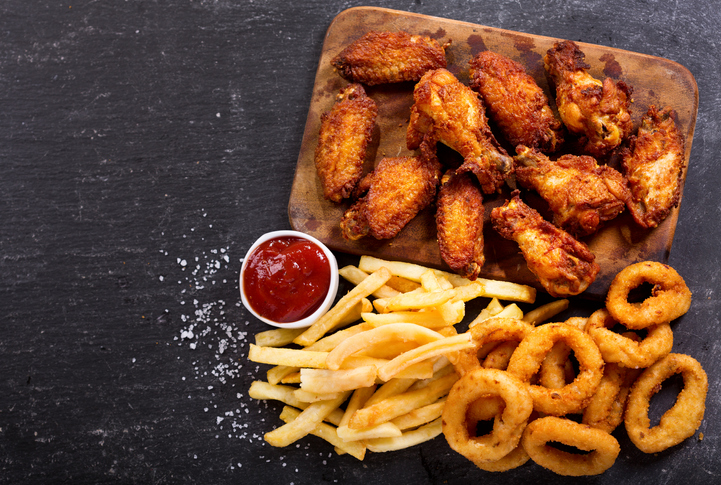
You know the saying “you are what you eat?” Well, there’s some truth to it, at least as far as your brain’s concerned. While eating the right foods can help you feel better, and even fight dementia , the wrong foods can negatively impact your cognitive abilities and even increase your risk of developing dementia, Alzheimer’s, and other diseases that can affect your memory. Here are 15 foods to avoid if you want to improve your brain’s health and live a long, healthy life. Fried foods | nitrub/iStock/Getty Images There’s no denying they taste good, but anything fried is just all around bad for you. In addition to being loaded with fat and calories, fried foods also cause inflammation in your brain, leading to memory loss and brain fog. Not to mention eating a diet high in fried foods leads to weight gain, and weight gain can negatively impact your brain’s health. Opt for baked or grilled meats, potatoes, and veggies instead of fried. Your brain will thank you. Next : Say goodbye to your favorite drive-thru. Fast food meal | cookelma/iStock/Getty Images This one probably isn’t a shocker for anyone. Fast food is sky high in saturated fats, which can make it difficult for your body to fight off the plaque that causes Alzheimer’s. In addition, fast food is loaded with sodium, which causes almost immediate memory decline. If you have ever had a hard time concentrating after eating a meal from your favorite fast food restaurant, you know what we’re talking about. If you can’t avoid eating at a fast food restaurant, opt for a salad or grilled chicken sandwich to save calories and reduce your sodium intake. Two glasses of soda | tongpatong/iStock/Getty Images There’s absolutely nothing nutritional about soda or other sugary drinks. Aside from […]
10 Delicious Foods to Feed Both Body and Mind
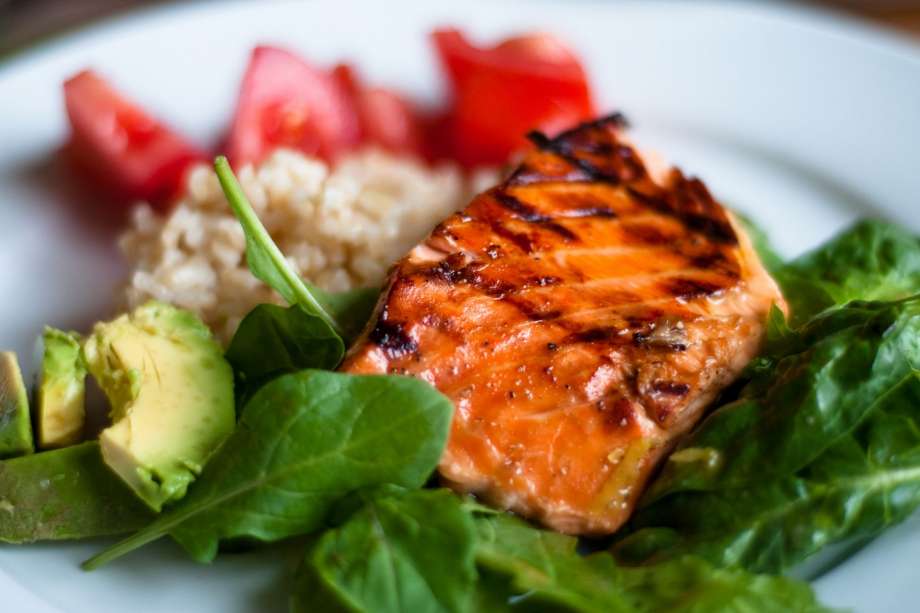
What you eat has a massive impact not only on your body, but on your brain. Before you eat anything, take a moment to ask: Does this fuel my body or hurt my body? Are you feeding your body food that is high in nutritional value? Eating the right foods in the right amounts will help you stay healthier, and will also fine-tune your brain cells for a life of mental agility. The right diet can help you stay focused, energetic and mentally sharp. There are plenty of tasty but healthy alternatives at your local grocery store. You just have to know what to look for. To help get you mentally in shape, here are some pro tips on 10 brain-boosting foods that will feed your mind along with your body. 1. Indulge in dark chocolate. It’s OK to give in to your craving for chocolate . Just make sure you’re indulging in dark chocolate that contains at least 70 percent cacao. Cacao contains flavonoids, an important antioxidant, and is known to support brain health and function. Research suggests that the flavonoids in chocolate may help reverse some memory problems. Dark chocolate can also improve the brain’s plasticity, which is crucial to many brain functions, including learning and memory. Just make sure you’re sticking with healthier dark chocolate. Most chocolate bars don’t offer the health benefits of dark chocolate, and the high levels of sugar can actually accelerate aging and inflammation. 2. The power of protein. Protein makes up 20 percent of the human body and is one of the building blocks required to function and maintain good health. This means that getting enough protein is an important part of any diet and is extremely beneficial to maintaining brain health. Some studies have found that high-protein diets may protect […]
Organika Health Products New Adaptogen Line Helps the Body Cope with Life’s Stressors
Used for centuries in ayurvedic and traditional Chinese medicine, adaptogens have a unique ability to "adapt" their function according to our body’s specific needs. When we’re exposed to life’s stressors, our homeostasis is disrupted and so are the systems of the body. Best known for their mood-enhancing, anxiety-reducing, immune strengthening and beauty-boosting benefits, adaptogens can help improve our resistance to stress and normalize our body’s functions. "Adaptogens have been used for thousands of years," says Rhiannon Lytle, Registered Holistic Nutritionist. "Today, studies are done in the western world to show what traditional cultures have known for centuries: these herbs and mushrooms are beneficial to help us find balance." Organika’s new adaptogen line products: CALM: Using organic chaga mushroom powder from Mushroom Harvest farm in Washington, the CALM product helps keep our stress response at its best. Chaga’s key nutrients allow it to activate potent immune cells, such as lymphocytes and macrophages, which may reduce the risk of developing chronic illnesses. Not only can chaga help reduce anxiety, improve digestion, and even boost longevity, its antioxidants support cellular regeneration and protect against genetic mutation. GLOW: Traditionally used as a beauty tonic, this product uses organic schisandra sourced from China and hibiscus powder sourced from Egypt to help improve the luster of skin and hair. Taken on a regular basis, GLOW can also help to maintain vitality, enhance your energy, and even provide liver and adrenal support. Schisandra berries additionally aid in liver detoxification to help reduce the signs of stress and inflammation which causes signs of aging skin. Plus, when we have a healthy liver, we have stronger immunity and are more able to ward off illness. MEMORY: 100% lion’s mane from Mushroom Harvest farms in the USA. Lion’s mane is a promising ingredient that could help support longevity and […]
Something in our brain is lost when we use GPS
It has become the most natural thing to do: get in the car, type a destination into a smartphone, and let an algorithm using GPS data show the way. Personal GPS-equipped devices entered the mass market in only the past 15 or so years, but hundreds of millions of people now rarely travel without them. These gadgets are extremely powerful, allowing people to know their location at all times, to explore unknown places and to avoid getting lost. But they also affect perception and judgment. When people are told which way to turn, it relieves them of the need to create their own routes and remember them. They pay less attention to their surroundings. And neuroscientists can now see that brain behavior changes when people rely on turn-by-turn directions. In a study published in Nature Communications in 2017, researchers asked subjects to navigate a virtual simulation of London’s Soho neighborhood and monitored their brain activity, specifically the hippocampus, which is integral to spatial navigation. Those who were guided by directions showed less activity in this part of the brain than participants who navigated without the device. “The hippocampus makes an internal map of the environment and this map becomes active only when you are engaged in navigating and not using GPS,” Amir-Homayoun Javadi, one of the study’s authors, told me. The hippocampus is crucial to many aspects of daily life. It allows us to orient in space and know where we are by creating cognitive maps. It also allows us to recall events from the past — what is known as episodic memory. And, remarkably, it is the part of the brain that neuroscientists believe gives us the ability to imagine ourselves in the future. Studies have long shown the hippocampus is highly susceptible to experience. (London’s taxi drivers […]
Connor: What’s lost when we rely on GPS

Personal GPS-equipped devices entered the mass market in only the past 15 or so years, but hundreds of millions of people now rarely travel without them. [Courtesy Photo] Hide caption By M.R. O’Connor/The Washington Post It has become the most natural thing to do: get in the car, type a destination into a smartphone, and let an algorithm using GPS data show the way. Personal GPS-equipped devices entered the mass market in only the past 15 or so years, but hundreds of millions of people now rarely travel without them. These gadgets are extremely powerful, allowing people to know their location at all times, to explore unknown places and to avoid getting lost. But they also affect perception and judgment. When people are told which way to turn, it relieves them of the need to create their own routes and remember them. They pay less attention to their surroundings. And neuroscientists can now see that brain behavior changes when people rely on turn-by-turn directions. In a study published in Nature Communications in 2017, researchers asked subjects to navigate a virtual simulation of London’s Soho neighborhood and monitored their brain activity, specifically the hippocampus, which is integral to spatial navigation. Those who were guided by directions showed less activity in this part of the brain than participants who navigated without the device. “The hippocampus makes an internal map of the environment and this map becomes active only when you are engaged in navigating and not using GPS,” Amir-Homayoun Javadi, one of the study’s authors, told me. The hippocampus is crucial to many aspects of daily life. It allows us to orient in space and know where we are by creating cognitive maps. It also allows us to recall events from the past, what is known as episodic memory. And, remarkably, […]
Opinion: What we lose when we rely on GPS for navigation
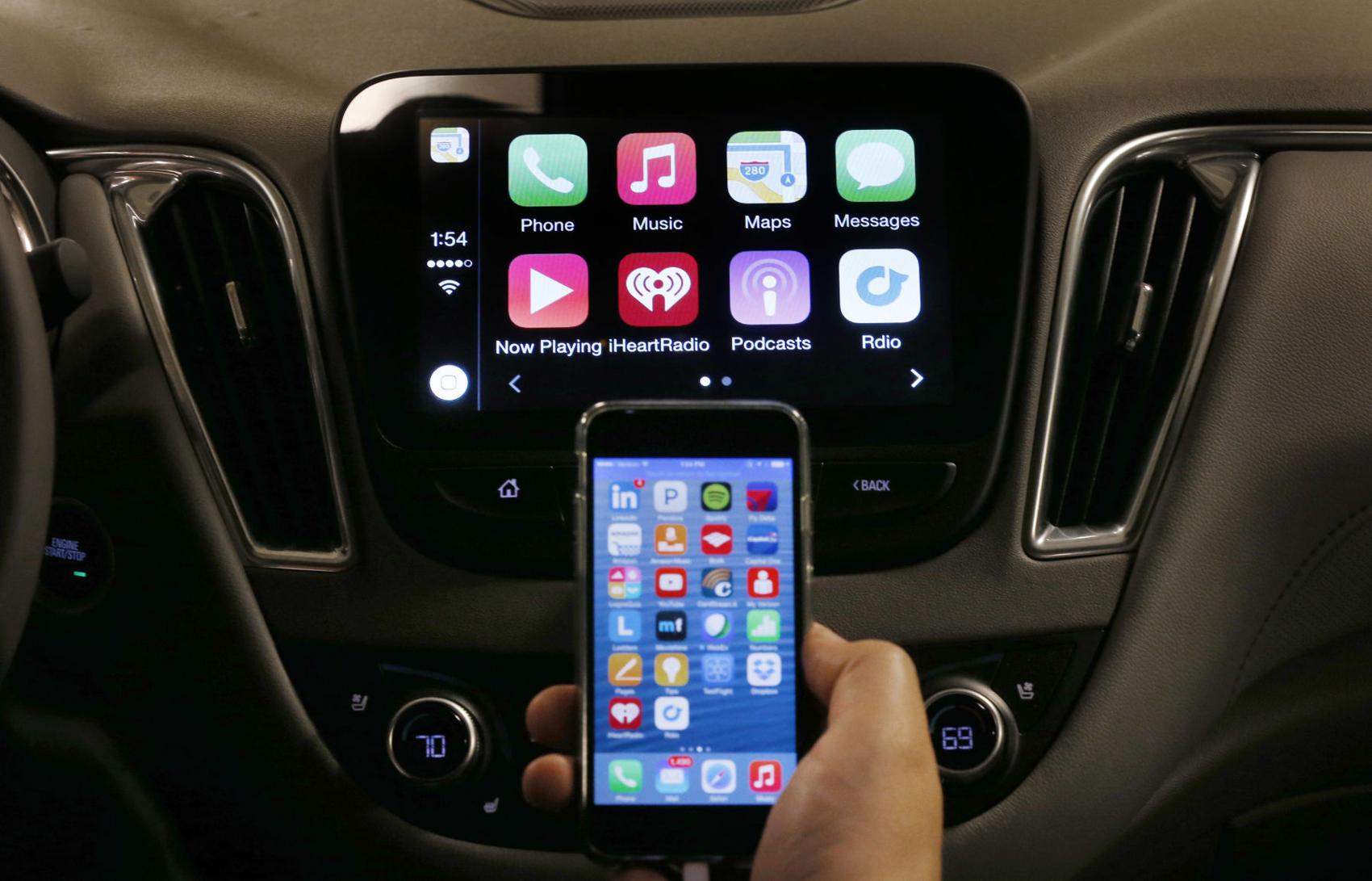
An iPhone is connected to a 2016 Chevrolet Malibu equipped with Apple CarPlay apps, displayed on the car’s MyLink screen, top, during a demonstration in Detroit. It has become the most natural thing to do: get in the car, type a destination into a smartphone, and let an algorithm using GPS data show the way. Personal GPS-equipped devices entered the mass market in only the past 15 or so years, but hundreds of millions of people now rarely travel without them. These gadgets are extremely powerful, allowing people to know their location at all times, to explore unknown places and to avoid getting lost. But they also affect perception and judgment. When people are told which way to turn, it relieves them of the need to create their own routes and remember them. They pay less attention to their surroundings. And neuroscientists can now see that brain behavior changes when people rely on turn-by-turn directions. In a study published in Nature Communications in 2017, researchers asked subjects to navigate a virtual simulation of London’s Soho neighborhood and monitored their brain activity, specifically the hippocampus, which is integral to spatial navigation. Those who were guided by directions showed less activity in this part of the brain than participants who navigated without the device. “The hippocampus makes an internal map of the environment and this map becomes active only when you are engaged in navigating and not using GPS,” Amir-Homayoun Javadi, one of the study’s authors, told me. The hippocampus is crucial to many aspects of daily life. It allows us to orient in space and know where we are by creating cognitive maps. It also allows us to recall events from the past, what is known as episodic memory. And, remarkably, it is the part of the brain that neuroscientists […]
Public Pulse: Help with early onset Alzheimer’s; Consolidate school districts; Delay hurts rural hospitals
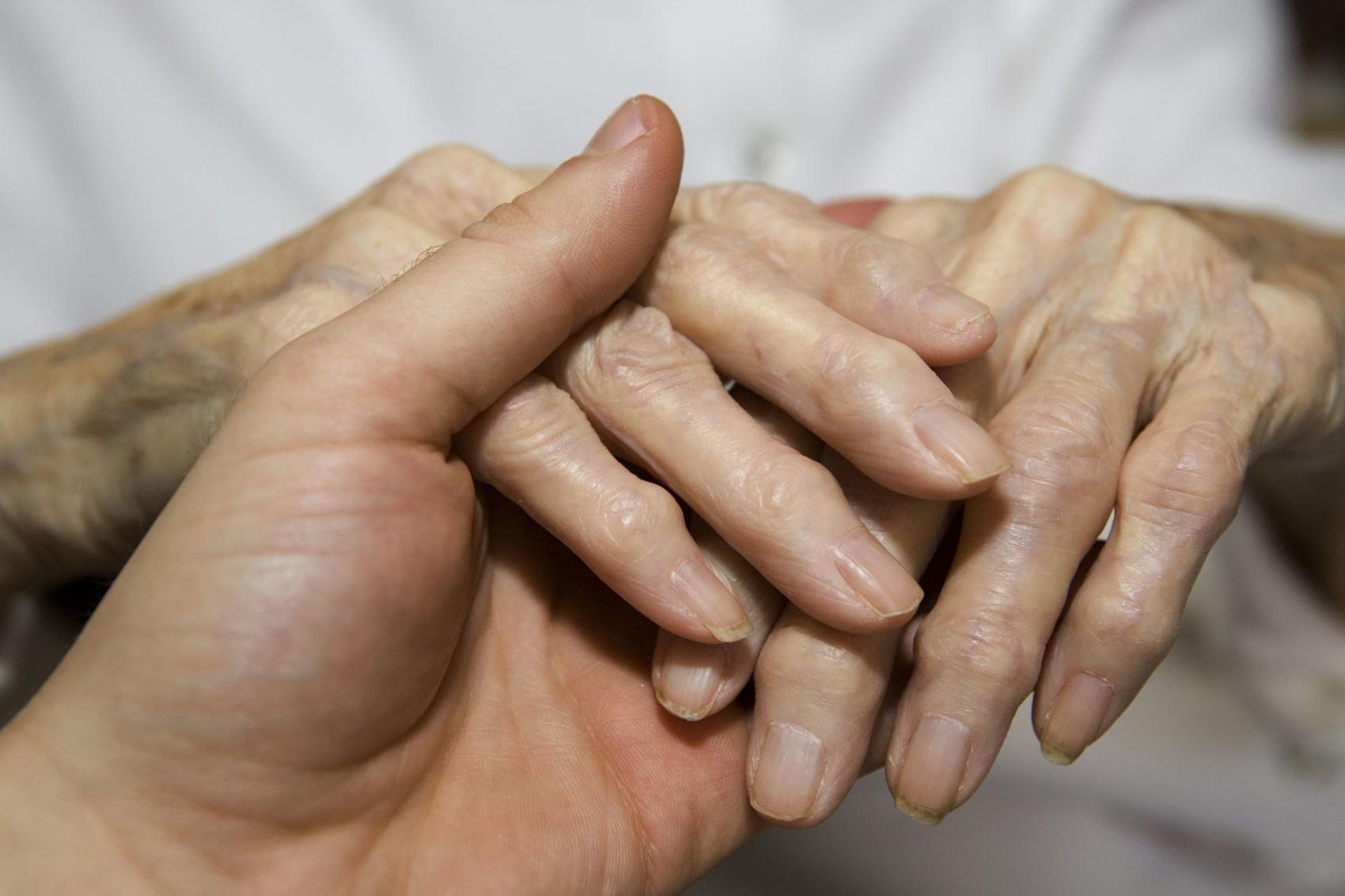
An estimated 200,000 Americans under the age of 65 are living with Younger-Onset Alzheimer’s Disease, and my mother, Anne Marie, was one of them. As someone who cared for a loved one with dementia, I understand the burden that 34,000 Nebraskans with Alzheimer’s and their families are facing. I lost my mom in February at age 60 after an eight-year-battle with this horrific disease. When my mom was diagnosed, I was 22 and my sister was 16. Our father had died a few years prior to brain cancer, and we were on our own. Alzheimer’s is exceptionally difficult when the individual is younger than 65. My mother could no longer teach. She lost her job, her income and insurance that supported us. My sister in high school, who didn’t have her license, drove our mom to appointments because there was no alternative. I’d leave work every day at lunch to check on her because we couldn’t afford in-home care. I want to thank Sen. Deb Fischer from the bottom of my heart for co-sponsoring the Younger-Onset Alzheimer’s Disease Act. I’m grateful that politicians like Fischer understand the challenges and want to make positive changes for families like ours. Through the act, individuals under 60 living with the disease would have access to transportation, respite services for family caregivers and other services to improve the quality of life. I’m asking other members of Congress to please co-sponsor the Younger-Onset Alzheimer’s Disease Act of 2019 (H.R. 1903/S. 901) to help families get the support they desperately need. A tremendous amount of energy was expended during the recent Nebraska legislative session regarding the high cost of property taxes and proposals to reduce that burden. Nebraska has become a very expensive state in which to reside from a tax perspective. Along with the […]
Why Can’t I Get Pregnant? – Health – Nairaland

With NeoLife Nutritional Whole-foods Supplements, your Infertility Worries are OVER! Infertility is usually defined as the failure to conceive after a year or more of regular sexual activity during the time of ovulation. Infertility arises from different factors such as; (A) Thick mucus in the Fallopian Tubes. (B) Damaged Fallopian Tubes. (C) Ovaries fails to release Eggs, because of adhesions. (D) Uterus contain Fibroid, its lining may be affected by Endometriosis. (E) Failure to Ovulate, due to Hormonal Imbalance caused by Cyst or effect of Radiation treatments. (F) Sexually transmitted Infections like; Syphilis, Gonorrhoea, Chlamydia. (G) Progesterone becomes Imbalanced. Causing miscarriages as fertilized eggs can not survive due to Imbalanced hormones. (H) Birth Control Pills and Injections, can also lead to Infertility in women. Correct your body metabolism with our GNLD NEOLIFE Nutritional Supplements! Are you keen of conception this year? You’ll need to thoroughly engage yourself in routine purification of your Hormonal System with these GNLD NEOLIFE Supplements; (1) Feminine Herbal Complex in 60 Tablets • Balances and regulates woman’s monthly cycle. • Increases fertility chances, eradicates P.M.S. • Regulate heavy menstrual flow. • Prevent premature menopause. SPECIALTY HERBAL FOR OPTIMAL WELLNESS Contains 10 herbs in a delicate, balanced mix to help women achieve a state of optimal health, comfort, calmness, and vitality St. John’s Worth, shown to help support calmness, boost spirits, and promote positive mental attitude* Vitex and Red Sage, Support normal female physiology and function. Benefits: Reduces inflammation. Relaxes muscle spasms. Promotes vitality. Supports normal female function. Reduces excessive sweating. Reduces menstrual cycle irregularities. Relieves mild depression. Overcomes heavy menstrual flow. Relieves irritability and anxiety. Assist in excretion of excess fluid. Reduce nervous tension. Relieves urine retention. It gives stamina and endurance. It reduces abdominal bloating. It is good for swollen fingers/ankles and legs. It […]
The way we feel depends on what we eat and it’s high time we accepted it

Are you feeling down and out? Thinking of popping an antidepressant? Think again! Meds work by stopping the body from boosting a chemical in the brain known as serotonin (that calms, relaxes, and even makes you feel less hungry), leading to a better mood. But on the flip side, the mood-enhancing drugs may land you some unpleasant side-effects like headaches and mood swings. Plus, there’s always a risk of getting dependent on them. So, trust the natural solutions instead. When you’re feeling blue, help could be as close as your refrigerator. You feel good when you eat right. Sadly, that’s a fact most of us miss out on. You can rectify that now by focusing on the good mood nutrients. Focus on Protein Leafy greens, soya and dairy products have plenty of protein (Source: Reuters) Proteins contain tryptophan, an essential amino acid (the protein that you eat is broken down into amino acids in the body) that converts to serotonin (the calming chemical) in the brain. Plus, another amino acid – tyrosine – found in protein rich foods is also essential for the brain as it increases the production of the neurotransmitters dopamine, norepinephrine and epinephrine. These are said to promote mental alertness and boost the feeling of well-being. Get the power: Ensure that you have 50-60gm of protein each day from fish, poultry, meat and eggs. Vegetarians needn’t fret. To score enough opt for seeds and nuts, legumes, soya (nuggets, tofu, soya milk), and dairy. Don’t ban the Carbohydrates Less carbohydrate intake can lead to low serotonin levels (Source: Reuters) Don’t just depend on protein; remember that the much-maligned carbohydrates are equally important. In fact, tryptophan from protein works best when consumed along with some carbohydrates. Why do you think dieters who cut down on carbs tend to […]
7 Supplements that Improve Brain Function
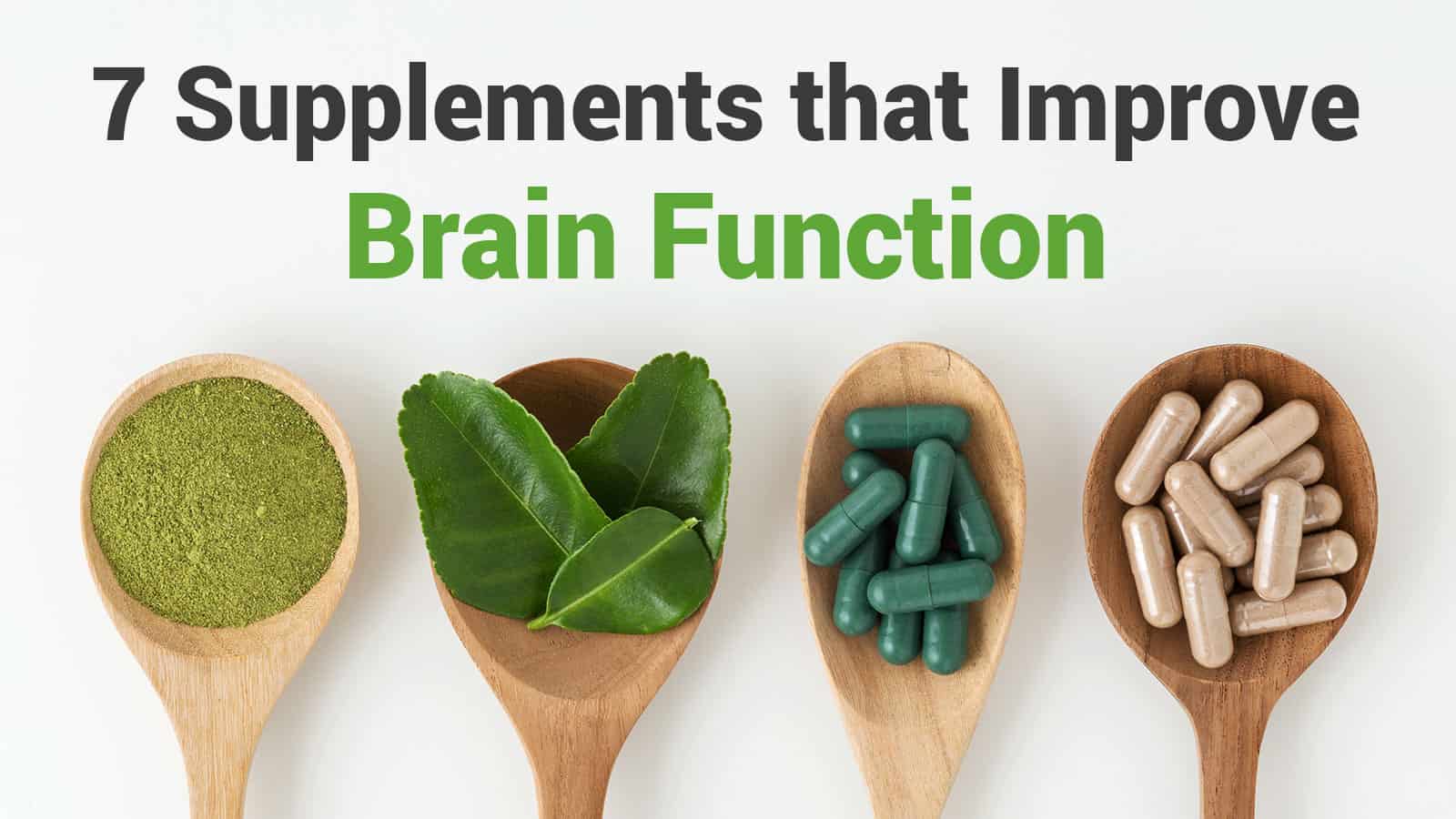
It is rumored that as humanity progresses, our brain function will operate like the physical body of someone in the Mega Man Triathlon. In the relatively recent past, being capable of heavy lifting and having dexterity, quick reflexes, and stamina were crucial to both survival and making a living. Presently, much of our lives are relying on high brain functionality, and supplements are starting to make their way into the conversation about optimal brain health. Technology development requires high attention to detail, the ability to quickly analyze and make a decision, and to absorb, remember, and utilize increasing amounts of information. Currently, many companies are working on developing various computer-brain integrations to both improve the lives of those with disabilities and also enhance and surpass our current mental capabilities. We have begun to acknowledge, no matter how slowly, that increasing brain function is vital in how we care for ourselves. As we start to feel the stress on our brains to handle our jobs, families, external stimuli, and an increasingly technological society, we are seeking more ways to enhance our brain through supplements. Could I be “burned out”? Life often comes filled with high-demand situations. Even positive events can create stress. Over time, this stress accumulates, and we start to feel exhausted or “burned out.” Often when we think of exhaustion, we only think of the physical symptoms: Fatigue Headaches Insomnia Appetite changes Increased illnesses or infections We may not always realize the symptoms of mental exhaustion. Mental exhaustion is considered to be created from long-term stress; it produces physical and emotional symptoms, which later display themselves in specific behaviors. Emotional symptoms of mental exhaustion Our emotions also stem from our brain. They are inexplicably linked. When mental exhaustion sinks in, you may see symptoms such as: Anxiety and […]
6 Ways Scenic Views of Nature Help Heal the Mind and Body
It’s no secret that our environments affect our well-being. Studies show that there are significant long-term health benefits to being in or around nature. In healthcare settings, many facilities are bringing nature into their rooms because research has shown that “natural scenes are restorative, and are most liked when they have a depth perspective and an element of mystery.” Educators are even embracing the positive impacts of students spending time outside. The positive effects of nature are being incorporated into learning with the utilization of outdoor classrooms which are touted as providing physical, cognitive, and psychological benefits for students. Obviously spending time outdoors has great benefits for our minds and bodies but sometimes a trek through the jungle or a trip to the beach isn’t practical. No worries. Experts say even viewing scenes of nature “reduces anger, fear, and stress, and increases pleasant feelings.” Specifically, nature has the power to restore, soothe, heal, and increase our feelings of connectedness. Here are some specific ways that scenic nature views help our mind and body. Nature Decreases Stress A study done of 46 students showed that viewing scenic greeneries increased the activity of the parasympathetic nervous system. Using EKGs, researchers found that when the participants viewed the natural images, their stress levels lowered. In addition to helping reduce stress, studies have shown that participants who viewed a scenic view prior to being exposed to a stressor had enhanced recovery and were, thus, better able to handle the stressor. Improves Executive Attention Research has shown that “viewing nature… pictures significantly improved executive attention in both older and young adults…”. Executive attention refers to a part of the brain responsible for drawing on internal information and memories to adapt our thoughts and behaviors. Executive attention is vital to planning, decision-making, and correcting errors, […]
Opinion: Here’s what gets lost when we rely on GPS
It has become the most natural thing to do: get in the car, type a destination into a smartphone, and let an algorithm using GPS data show the way. Personal GPS-equipped devices entered the mass market in only the past 15 or so years, but hundreds of millions of people now rarely travel without them. These gadgets are extremely powerful, allowing people to know their location at all times, to explore unknown places and to avoid getting lost. But they also affect perception and judgment. When people are told which way to turn, it relieves them of the need to create their own routes and remember them. They pay less attention to their surroundings. And neuroscientists can now see that brain behavior changes when people rely on turn-by-turn directions. In a study published in Nature Communications in 2017, researchers asked subjects to navigate a virtual simulation of London’s Soho neighborhood and monitored their brain activity, specifically the hippocampus, which is integral to spatial navigation. Those who were guided by directions showed less activity in this part of the brain than participants who navigated without the device. “The hippocampus makes an internal map of the environment and this map becomes active only when you are engaged in navigating and not using GPS,” Amir-Homayoun Javadi, one of the study’s authors, told me. The hippocampus is crucial to many aspects of daily life. It allows us to orient in space and know where we are by creating cognitive maps. It also allows us to recall events from the past, what is known as episodic memory. And, remarkably, it is the part of the brain that neuroscientists believe gives us the ability to imagine ourselves in the future. Studies have long shown the hippocampus is highly susceptible to experience. (London’s taxi drivers famously […]
Medical Marijuana and Parkinson’s Disease: Is It Safe?

As more states have signed up to legalize medical cannabis, patients have increasingly been exploring it as a way to treat their Parkinson’s symptoms. Interest in using marijuana to treat the symptoms of Parkinson’s disease has grown in recent years as 33 states and the District of Columbia have legalized it for medical use. Although the federal government has not approved medical marijuana itself, the U.S. Food and Drug Administration (FDA) has authorized some therapies that use specific marijuana components. the FDA has given it’s okay for the THC-based drugs Marinol (dronabinol) and Cesamet (nabilone) to ease nausea during cancer treatment and stimulate appetite. THC, or tetrahydrocannabinol, is an active component in cannabis known to effect mood, behavior, and thinking. The FDA has also greenlighted the use of CBD (cannabidiol) in a medication for childhood epilepsy called Epidiolex. CBD differs from THC in that it does not produce mind-altering effects. Known as cannabinoids , CBD and THC act on cannabinoid receptors in the brain that regulate body functions and have been shown to play a role in Parkinson’s , according to an article published in 2017 in the journal Cannibis and Cannabinoid Research . Still, the federal government has yet sign off on any marijuana-based formulas that might help the symptoms of this neurological disorder. Should I Use Medical Marijuana if I Have Parkinson’s? As more states have signed up to legalize medical cannabis, patients have increasingly been exploring it as a way to treat their Parkinson’s symptoms. Some who may have found standard drugs to be insufficient turn to marijuana to help sleep, lower anxiety, or reduce tremors, according to the Parkinson’s Foundation . Robert Duarte, MD , director of Northwell Health’s Pain Center in Great Neck, New York, treats several patients with Parkinson’s who have tried medical […]
Here’s what gets lost when we rely on GPS

It has become the most natural thing to do: get in the car, type a destination into a smartphone, and let an algorithm using GPS data show the way. Personal GPS-equipped devices entered the mass market in only the past 15 or so years, but hundreds of millions of people now rarely travel without them. These gadgets are extremely powerful, allowing people to know their location at all times, to explore unknown places and to avoid getting lost. But they also affect perception and judgment. When people are told which way to turn, it relieves them of the need to create their own routes and remember them. They pay less attention to their surroundings. And neuroscientists can now see that brain behavior changes when people rely on turn-by-turn directions. In a study published in Nature Communications in 2017, researchers asked subjects to navigate a virtual simulation of London’s Soho neighborhood and monitored their brain activity, specifically the hippocampus, which is integral to spatial navigation. Those who were guided by directions showed less activity in this part of the brain than participants who navigated without the device. "The hippocampus makes an internal map of the environment and this map becomes active only when you are engaged in navigating and not using GPS," Amir-Homayoun Javadi, one of the study’s authors, told me. The hippocampus is crucial to many aspects of daily life. It allows us to orient in space and know where we are by creating cognitive maps. It also allows us to recall events from the past, what is known as episodic memory. And, remarkably, it is the part of the brain that neuroscientists believe gives us the ability to imagine ourselves in the future. Studies have long shown the hippocampus is highly susceptible to experience. (London’s taxi drivers famously […]

